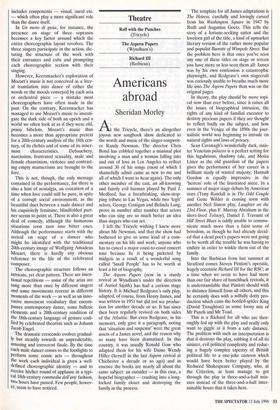Theatre
Roll with the Punches (Tricycle) The Aspern Papers (Wyndham's) Richard III (Barbican)
Americans abroad
Sheridan Morley
At the Tricycle, there's an altogether joyous new songbook show dedicated to the words and music of the singer-songwrit- er Randy Newman. The director. Chris Bond has cobbled together a minimal plot involving a man and a woman falling into and out of love in Los Angeles to reflect around 30 of his songs (most of which I shamefully admit came as new to me and all of which I want to hear again). The only other member of the cast, an all-knowing and faintly evil barman played by Paul J. Medford, has a breathtaking, show-stop- ping tribute to Las Vegas, while two 'legit' actors, George Costigan and Belinda Lang, prove in number after number that actors who can sing are so much better an idea than singers who can act.
I left the Tricycle wishing I knew more about Mr Newman, and that the show had bothered to give us some kind of a com- mentary on his life and work; anyone who has to cancel a major coast-to-coast concert tour because he is being picketed by Midgets as a result of a wonderful song called 'Small People' has to be worth at least a bit of biography.
The Aspern Papers (now in a sturdy revival at Wyndham's under the direction of Auriol Smith) has had a curious stage history. It is Michael Redgrave's only play, adapted, of course, from Henry James, and was written in 1951 but clid not see produc- tion for another decade or so. It has since then been regularly revived on both sides of the Atlantic. But even Redgrave, in his memoirs, only gave it a paragraph, noting that 'situation and suspense' were the great assets of a James novel, and the reason why so many have been dramatised, In this country, it was usually Ronald Gow who adapted them for his wife Dame Wendy Hiller (herself in the last Aspem revival at Chichester a decade or so ago) and in essence the books are nearly all about the same subject: an outsider — in this case, a hopeful biographer — crashing into a long- locked family closet and destroying the family in the process. The template for all James adaptations is The Heiress, carefully and lovingly carved from his Washington Square in 1947 by Ruth and Augustus Goetz. This tells the story of a fortune-seeking suitor and the lovelorn girl of the title, a kind of upmarket literary version of the rather more popular and populist Barrens of Wimpole Street. But the problem here is that once you've seen any one of these titles on stage or screen you have more or less seen them all: James was by his own confession a catastrophic playwright, and Redgrave's own stagecraft was curiously unable to breathe much more, life into The Aspem Papers than was on the original pages.
In theory, the play should'be more topi- cal now than ever before, since it raises all the issues of biographical intrusion, the rights of any kind of familial executor to destroy precious papers if they are thought to reflect badly on the subject, and how even in the Venice of the 1890s the jour- nalistic world was beginning to intrude on natural rights and laws of privacy.
Sean Cavanagh's wonderfully dark, sinis- ter Venetian palazzo is a perfect setting for this lugubrious, shadowy tale, and Moira Lister as the old guardian of the papers gives the performance of her career in a brilliant study of wasted majesty; Hannah Gordon is equally impressive in the 'heiress' role of the frustrated niece. In a summer of major stage debuts by American stars (Tony Randall is in The Odd Couple and Gene Wilder is coming soon with another Neil Simon play, Laughter on the 23rd Floor, plus F. Murray Abraham in the short-lived Tolstoy), Daniel J. Travanti of Hill Street Blues is oddly unable to commu- nicate much more than a faint sense of boredom, as though he had already decid- ed that a dead poet's papers were not going to be worth all the trouble he was having to endure in order to winkle them out of the family.
Into the Barbican from last summer at Stratford comes Steven Pimlott's operatic, hugely eccentric Richard III for the RSC; at a time when we seem to have had more than our fair share of hunchback revivals, it is understandable that Pimlott should wish to distance himself from all others, and this he certainly does with a wilfully dotty pro- duction which casts the bottled-spider King (David Troughton) as some loony mix of Mr Punch and Mr Toad.
This is a Richard for all who are thor- oughly fed up with the play and really only want to giggle at it from a safe distance. The problem with such an interpretation is that it destroys the play, robbing it of all its sinister, evil political complexity and reduc- ing a hugely complex tapestry of British political life to a one-joke cartoon which would have been better played by the Reduced Shakespeare Company, who, at the Criterion, at least manage to get through the play in three-and-a-half min- utes instead of the three-and-a-half inter- minable hours that it takes here.


































































 Previous page
Previous page